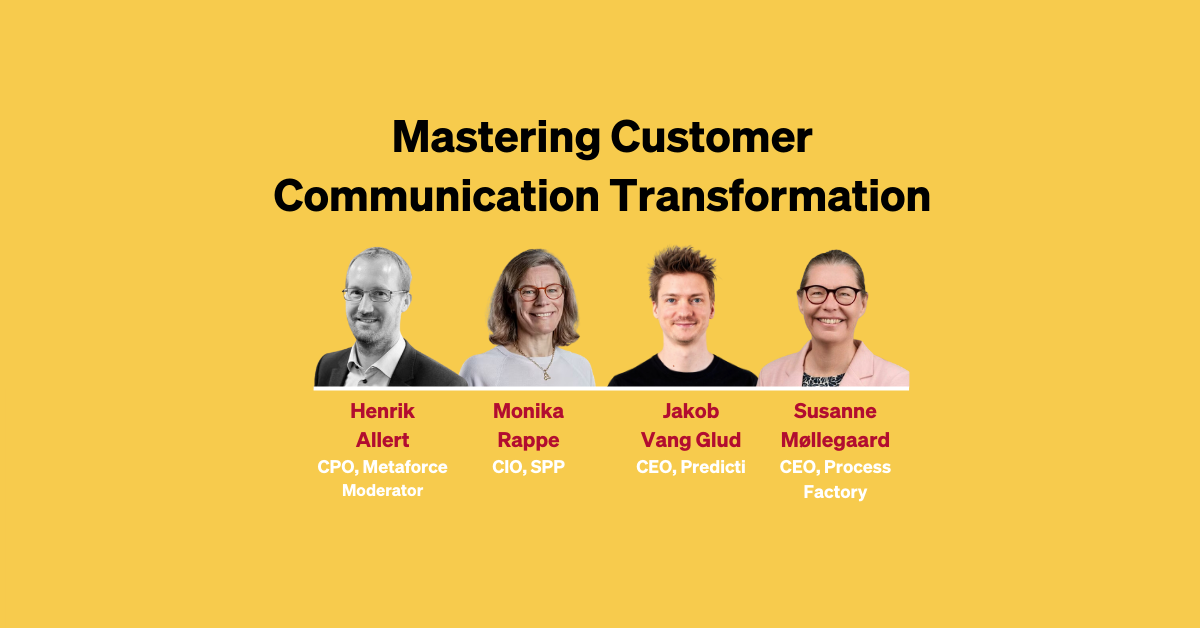The recent Metaforce webinar, Mastering Successful Customer Communication Transformation, brought together industry leaders to discuss the rapid evolution of customer communication. Led by Henrik Allert, Chief Product Officer at Metaforce, the session delved into how organizations can transform communication strategies to meet modern demands.
The webinar featured a distinguished panel:
- - Susanne Møllegaard, CEO Process Factory
- - Monika Rappe, CIO SPP
- - Jacob Vang Glud, CEO and Co-Founder of Predicti
Industry Shifts in Customer Communication
The session kicked off with Henrik summarizing insights from a recent Metaforce customer event highlighting significant shifts in the customer communication management (CCM) space:
- From Outbound to Interactive: Customer communication is transitioning from traditional outbound channels to more dynamic, bidirectional dialogs. Customers now expect real-time, responsive engagement instead of one-way notifications.
- Shift in Ownership: CCM is moving from IT departments to business operations, reflecting its integration into core business strategies and budgets.
- Insourcing vs. Outsourcing: There’s a strong trend toward insourcing communication management capabilities to ensure seamless integration within business operations.
- Embracing Generative AI: With the rise of generative AI, organizations are exploring controlled, compliance-oriented ways to leverage AI to enhance customer communication.
Key Strategic Challenges in Insurance Industry - Insights from Susanne Møllegaard
Susanne provided an overview of the insurance industry’s strategic landscape, highlighting four primary challenges:
- Digital Transformation: The push for end-to-end digital customer journeys remains a top priority. While the Nordic insurance industry is highly digitalized, there is a growing emphasis on creating seamless, on-demand customer experiences, often through AI-powered bots and mobile solutions.
- Consolidation and Collaboration: Partnerships are increasingly central to the insurance industry, especially as companies explore multibrand strategies and white-label solutions. This approach, however, brings integration complexities, especially when merging acquired companies into a unified customer experience.
- New Agility and Business Models: With the data explosion, insurers are innovating with new products and services. Embracing standardized, cloud-based solutions can increase agility and accelerate time to market.
- Regulation and Compliance: Regulations like GDPR, CSRD, DORA and the AI Act add complexity to the customer journey, necessitating careful data sharing, consent, and logging to meet compliance requirements.
Transforming Customer Communication – Monika Rappe’s Experience at SPP Monica shared her journey leading a comprehensive digital transformation at SPP, focusing on customer satisfaction, cost reduction, and digitalization:
- Enhanced Customer Satisfaction: SPP set out to improve the speed and quality of service for customers.
- Cost Reduction: Lower operational costs directly benefit customers, especially in life insurance, by maximizing their retirement savings.
- Automation and Digital Enablement: SPP consolidated its three outdated platforms into a modern system, capable of supporting interactive, digital customer communication
Monica emphasized the importance of treating transformation as a business initiative rather than a mere IT project, highlighting three success factors:
- Clear Vision and Value Focus: Aligning everyone on the project’s ultimate value—especially customer benefits—helped navigate challenges.
- Effective Communication: Using examples and metaphors early on helped teams understand the changes ahead.
- Celebrating Small Wins: Recognizing progress through small celebrations (even with ice cream!) kept teams motivated.
Reflecting on lessons learned, Monica noted that early challenges in communication and collaboration underscored the need for close, in-person cooperation. Once SPP’s team and Metaforce’s team worked together in the same office, alignment and problem-solving improved significantly.
Creating Success with Technology and Partnership – Insights from Jacob from Predicti shared a tech perspective on successful transformation projects, emphasizing:
- Clear Goals and Business Cases: A successful project requires a strong business case, with clear benefits to customer experience and operational efficiency.
- Regulation and Compliance: Working with customer data, especially combining internal and external sources, requires strict adherence to legal and consent requirements.
- Integration and Fit: To maximize success, Predicti’s tech solutions are designed as modular components that fit seamlessly within a client’s existing infrastructure.
Jacob highlighted the importance of ensuring a startup’s technology can align with the overarching goals of financial institutions, adding value without requiring major infrastructure overhauls.
Balancing In-House Capabilities and Partner Expertise
The discussion also touched on how to balance in-house expertise with outsourced capabilities. Jacob pointed out that some partnerships require end-to-end support, while others simply provide infrastructure for internal teams to build upon. Monica added that companies must define what makes them unique and retain control over those areas, while leveraging standardized solutions for non-differentiating elements to improve time to market and reduce costs.
Looking Ahead – The Role of AI in Customer Engagement
The panel concluded with thoughts on the future role of AI in customer engagement. Monica shared SPP’s recent award-winning initiative to use AI to help customers visualize their retirement dreams, emphasizing the potential for AI to enhance customer understanding and engagement through personalized visuals. Jacob and Susanne highlighted the potential for predictive analytics and generative AI to further personalize and improve the customer experience, provided that legal and compliance challenges are carefully managed.
Conclusion
In a world where customer expectations are rapidly evolving, businesses need to adapt their communication strategies accordingly. The panelists agreed that successful customer communication transformation requires a clear vision, collaborative partnerships, and a balance between digital agility and compliance. Platforms like Centerpoint Smartforms, designed for interactive digital dialogs, exemplify the shift toward modern, efficient customer engagement solutions that are ready to meet the demands of today’s market.

